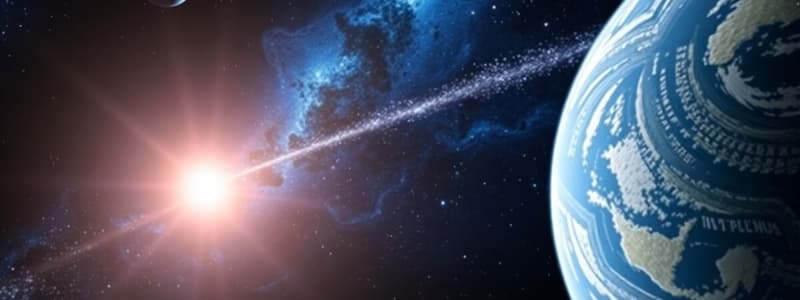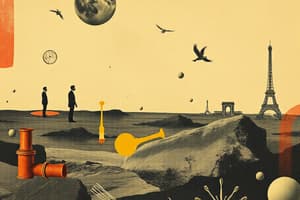Podcast
Questions and Answers
What is the meaning of the word 'Ayurveda'?
What is the meaning of the word 'Ayurveda'?
The science of good health and longevity of life.
Who is considered the father of our Nuclear Physics ?
Who is considered the father of our Nuclear Physics ?
Dr. Homi J. Bhabha
What is the name of the first satellite launched by India?
What is the name of the first satellite launched by India?
It was launched on 19 April 1975.
The 'White Revolution' was a program related to improving fish production in India.
The 'White Revolution' was a program related to improving fish production in India.
The 'Blue Revolution' was a program designed to improve the production of oilseeds in India.
The 'Blue Revolution' was a program designed to improve the production of oilseeds in India.
The Indian Space Research Organisation (ISRO) was established in 1969.
The Indian Space Research Organisation (ISRO) was established in 1969.
The first Indian to travel in space was Kalpana Chawla.
The first Indian to travel in space was Kalpana Chawla.
The 'Green Revolution' was a significant movement across the globe to increase crop production.
The 'Green Revolution' was a significant movement across the globe to increase crop production.
What is the name of the space agency of India?
What is the name of the space agency of India?
Which of the following is not a branch of science?
Which of the following is not a branch of science?
What is the scientific name for the element fluorine?
What is the scientific name for the element fluorine?
Who is credited for the groundbreaking research and contribution to atomic theory?
Who is credited for the groundbreaking research and contribution to atomic theory?
The ______ was invented by Sir Issac Newton, which is often considered one of the most important books in the ______ of science.
The ______ was invented by Sir Issac Newton, which is often considered one of the most important books in the ______ of science.
Who is known as the father of ayurvedic medicine?
Who is known as the father of ayurvedic medicine?
Who is the founder of the modern science of genetics?
Who is the founder of the modern science of genetics?
The White Revolution refers to the improving the production of Milk and Dairy products.
The White Revolution refers to the improving the production of Milk and Dairy products.
The Yellow Revolution refers to improve the self-sufficiency of Petroleum.
The Yellow Revolution refers to improve the self-sufficiency of Petroleum.
What is the name of the first human-made Earth satellite?
What is the name of the first human-made Earth satellite?
What does the term Sputnik mean in Russian?
What does the term Sputnik mean in Russian?
What is the name of India's first artificial satellite?
What is the name of India's first artificial satellite?
What is the name of India's first indigenous launch vehicle that placed the Rohini RS-1 satellite into orbit?
What is the name of India's first indigenous launch vehicle that placed the Rohini RS-1 satellite into orbit?
What is the name of the vehicle that put the SROSS-C satellite into orbit?
What is the name of the vehicle that put the SROSS-C satellite into orbit?
What is the name of India's first lunar probe?
What is the name of India's first lunar probe?
What is the name of India's first Mars Orbiter mission?
What is the name of India's first Mars Orbiter mission?
What is the name of India's first dedicated Indian Astronomy satellite mission?
What is the name of India's first dedicated Indian Astronomy satellite mission?
What is the name of the chemical symbol for ozone?
What is the name of the chemical symbol for ozone?
What is the name of the layer of space where the Good Ozone occurs naturally?
What is the name of the layer of space where the Good Ozone occurs naturally?
The Montreal Protocol was an international agreement to reduce the usage of CFCs in order to conserve Ozone Layer.
The Montreal Protocol was an international agreement to reduce the usage of CFCs in order to conserve Ozone Layer.
What is the name of India's space research organisation?
What is the name of India's space research organisation?
Who succeeded Dr. Vikram Sarabhai as the head of the Indian space programme?
Who succeeded Dr. Vikram Sarabhai as the head of the Indian space programme?
Flashcards
Astronomy
Astronomy
The study of celestial objects in the universe, including stars, planets, galaxies, and other celestial bodies.
Geology
Geology
The study of the Earth, its structure, and history, including rocks, minerals, and the processes that have shaped the planet.
Mineralogy
Mineralogy
The study of the chemistry, crystal structure, and physical properties of minerals.
Meteorology
Meteorology
Signup and view all the flashcards
Oceanography
Oceanography
Signup and view all the flashcards
Ecology
Ecology
Signup and view all the flashcards
Chemistry
Chemistry
Signup and view all the flashcards
Anatomy
Anatomy
Signup and view all the flashcards
Physiology
Physiology
Signup and view all the flashcards
Biology
Biology
Signup and view all the flashcards
Botany
Botany
Signup and view all the flashcards
Zoology
Zoology
Signup and view all the flashcards
Atmospheric science
Atmospheric science
Signup and view all the flashcards
Genetics
Genetics
Signup and view all the flashcards
Cosmology
Cosmology
Signup and view all the flashcards
Aerodynamics
Aerodynamics
Signup and view all the flashcards
Environmental science
Environmental science
Signup and view all the flashcards
Geophysics
Geophysics
Signup and view all the flashcards
Nuclear physics
Nuclear physics
Signup and view all the flashcards
Neurology
Neurology
Signup and view all the flashcards
Biophysics
Biophysics
Signup and view all the flashcards
Chemical engineering
Chemical engineering
Signup and view all the flashcards
Chemistry
Chemistry
Signup and view all the flashcards
Biochemistry
Biochemistry
Signup and view all the flashcards
Anthropology
Anthropology
Signup and view all the flashcards
Archaeology
Archaeology
Signup and view all the flashcards
Bacteriology
Bacteriology
Signup and view all the flashcards
Paleontology
Paleontology
Signup and view all the flashcards
Taxonomy
Taxonomy
Signup and view all the flashcards
Thermodynamics
Thermodynamics
Signup and view all the flashcards
Study Notes
SPOT Student Booklet
- This booklet is for students and teachers
- It covers the SPOT Prelims & SPOT 100's
- It's used during the test and real-time investigative project work
- The assessment is based on the learner's science aptitude
- The booklet helps students reaffirm their knowledge from their respective classes
- It also includes topics covered for the year
- The content includes: Branches of Science, Science in Ancient India, Great Scientists, India in Space, Amazing Facts about Science, Facts about Rockets, World Space Week, and Ozone Layer.
Branches of Science
- Science is a systematic study of the nature and manners of an object
- There are four major branches: Mathematics and logic, natural science, physical science, and social science
- Physical science is further classified into:
- Physics: The study of matter, motion, energy, force, etc.
- Chemistry: The study and analysis of elements, composition, and chemical processes
- Astronomy: The study of objects beyond Earth's atmosphere
- Earth Science is a branch of physical science
- Ecology: The study of the environment and the relationship between living organisms and their environment
- Oceanology: The study of the ocean
- Geology: The study of the Earth's structure and history
- Meteorology: The study of climate, rainfall, and weather
- Life Science or Biological science
- Biology: Natural science and in-depth study of living organisms
- Botany: The study of plants
- Zoology: The study of animals
- Human Biology: The study about human beings, nutrition, diseases, and medicine
- Genetic Science: The study of genes, genetic facts, and diseases
- Medicine: Diagnosis, research and treatment of diseases
Index
- The booklet includes an index for easy navigation
- Each topic has a corresponding page number.
Studying That Suits You
Use AI to generate personalized quizzes and flashcards to suit your learning preferences.




